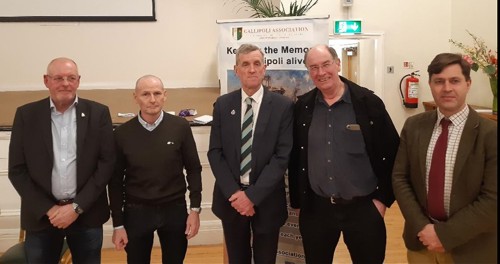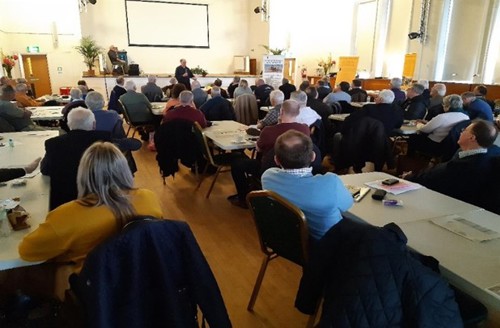Northern Regional Conference
Report on Northern Regional Conference March 14th 2020
This was the first time the Gallipoli Association had organised a regional conference. It was held in Eccles Town Hall, chosen because there is a strong connection between the North West and the campaign.
Paul Knight started us off with a very detailed presentation on the 42nd (East Lancashire) Division in Gallipoli, from mobilisation to the Third Battle of Krithia. This was the first Territorial division to be sent overseas. Paul showed us many rare photos of the various territorial battalions before the war and then gave a very detailed analysis of the staff work that led up to the, largely unsuccessful, battle. Interestingly, afterwards, he was approached by members of the audience who had family members in the Division.
Peter Hart gave a highly entertaining talk on the Royal Naval Division. As usual he talked without notes but showed an encyclopaedic knowledge of the campaign. His stories of the attitudes and behaviour of some of the younger officers, including Rupert Brooke, were interesting to say the least. His focus on the bravery of individuals and groups, within the division and the losses it suffered brought us back down to earth. A real tour de force.
Both Paul and Peter brought along books to sell and seemed to have few left.

Michael Crane. It was great to see Mike back in action after his serious illness and he was accompanied by family members to cheer him on (they all paid!). Mike brought along a number of highly detailed booklets which he sold. He kindly donated half of the money he received to the GA, bringing us another £85 in revenue. His talk was on the Final Offensive Actions of the 42nd Division focussing on two diversionary attacks, on 19th December 1915, carried out by the Lancashire Fusiliers, the East Lancs and the Manchesters. As well as providing background information on these units, he provided a very detailed account of the assault, one of the last in the campaign, including unique photographs and trench maps. His grandfather had taken part in this action.
Graham Walker talked about his work on Billy Unsworth a local lad who served in the campaign. He had hoped to show a video clip but the technology defeated us all. Nevertheless gave a very interesting talk about pre-war Salford and local volunteers.
Stephen Chambers and John Rodgers were unable to attend so I gave a talk on the 29th Division in Warwickshire, Gallipoli and the Western Front. I did not notice anyone dozing off. People laughed at the jokes and looked suitably serious at other times, so I presume it was well received.
The facilities at the venue were very good. It was completely accessible. There were some minor, unexpected problems with the technology (I had travelled up specifically to test it beforehand), particularly the clarity of some maps projected on the screen. However, most things worked most of the time.
I asked a member, Anthony Clifton Brown (the only other attendee, besides myself, in a GA tie!) to close the conference, which he did with aplomb.
Financially the event was a success. We had 71 paying attendees. 30 were members. All of the speakers gave their time on an expenses only basis. After paying these and the costs of the venue hire, we ended up with a small profit. Five members who said they were going to attend but then withdrew, generously gave £10 each as donations. Trustees have already received a copy of the accounts.
The above figures should be taken with a pinch of salt due to the indecipherable handwriting of some of those who attended!
At one time I had almost 100 on the list. 43 pulled out or did not attend for whatever reason. Only about half of these let me know. Without the pandemic this would probably not be repeated in future years. 19 turned up on the day without booking!

The only feedback we have received has been positive.
There were issues due to the pandemic. We made the decision to go ahead with the conference. To do so conformed with the Govt. guidance at that time. We did appropriate risk assessments and took measures to minimise the risk of infection, as did venue staff. Given what we have all been through since, however, I would urge caution when fixing the date of any subsequent event.
Trustees do have to decide whether to repeat the process next year and where any regional conference should be held. We would welcome the views of members. It is important to remember that the Annual Conference, normally in London, is the main event. It would be unfortunate if attendance at any regional conference reduced attendance at the AC. The geographical location needs to be chosen carefully. It is very helpful to have someone like Graham Walker, living in the area, to help with planning etc. Possible travel expenses for speakers need to be taken into account when choosing the area/venue.
Consideration also needs to be made regarding the charge (£10 was remarkably good value) and a booking system. Payment on the door carries some financial risk. Not providing lunch, which everyone seemed to accept, lessens this risk. The venue does need to have some outlets close by though.
My abiding memory is one of goodwill; goodwill displayed by the venue staff, by the speakers, those organisations and individuals that agreed to publicise the event and the 80 or so who attended. The GA does seem to be held in high regard.
My particular thanks go to Graham Walker, the “local agent” for his hard work and support.
Ian Binnie
May 2020.
